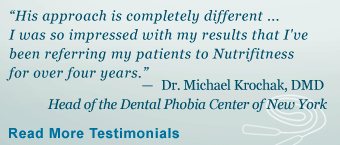|
Eight Important Tips When Choosing a Trainer
1. Ask the trainer where he gets his nutrition information from.
The right answer:
In-depth university study of biochemistry and research in respected medical journals.
The wrong answer:
From bodybuilding magazines, Internet health chat lines, gym hearsay, and fitness certification programs.
The reason:
There is a mass of misinformation available. Even good information requires an educated ability to understand its context and appropriateness for a given individual.
2. Ask the trainer about his knowledge of the muscle/skeletal structure of the body.
The right answer:
Studied physiology in a college / university program.
The wrong answer:
A fitness certification program and personal experience.
The reason:
Thousands of hours of study and hands on supervised experience go into a program of physiology and the college / university level. Athough certification programs provide generally good information, the level of study is minimal and memorization to "pass the test" is not the same as true broad based understanding.
3. Ask the trainer about his exercise methodology -- in detail.
The right answer:
Developed for each client base on their ability, goals, and medical appropriateness with l ong-term exercise training by professionals
The wrong answer:
A program that "works for me" and "exercises that I've seen in the gym by other fit people"
The reason:
While certain eating habits may "work" for one person, that doesn't mean it's entirely healthy, that it did work versus that person having a better genetic predisposition, or that it will work for everyone in a "one size fits all" way.
4. Ask him or her about their knowledge of digestion and bio-chemical processing of nutrients by the body.
The right answer:
Knowledge is based on years of college level study of human anatomy and physiology and biochemistry with extensive supervised interning
The wrong answer:
I know what works for me and I do a lot of "research" in magazines, newspapers, television, and the internet.
The reason:
Misinformation is more readily available than reliable information. Information from many sources are biased in order to promote profitable industries such as supplement manufacturers or pharmaceutical companies. Even good information requires the educated ability to critically evaluate what is written and how it will benefit a given person.
5. Ask them for recommendations and ask their clients about real results.
You know the right and wrong answers here.
6. Ask other trainers if they think a trainer's clients exercise correctly and if not what could be improved or what is dangerous.
The majority of trainers will not likely be able to tell you.
7. Observe trainers and see if they are concentrating on their clients, or are they daydreaming, talking to others or using their cell phone.
Would you want them training you?
8. Finally tell the prospective trainer that you want to be truly fit, live life to its fullest as long as possible and be healthy.
If she or he looks at you a bit stunned -- that trainer is probably not a real fitness and nutrition expert. Even trainers that "talk a good game" will not be able to help you with a safe, maximally effective, and maintainable program if they do not have any formal education.
Importance of Health Science Education for Personal Fitness Trainers: A UCLA Study.
Using a questionnaire, the Fitness Instructors Knowledge Assessment, doctors from the UCLA Exercise Physiology research Laboratory examined relations between commonly used indicators of knowledge (training and experience) and actual knowledge in the five areas of (a) nutrition, (b) health screening, (c) testing protocols, (d) exercise prescription, and (e) general training knowledge regarding special populations. FIKA provided reliable measures of knowledge in these areas, which are of critical importance in developing an optimal fitness program for the client and for avoiding unnecessary injuries.
A survey of 115 health fitness professionals revealed that a bachelor's degree in the field of exercise science and possession of American College of Sports Medicine or the National Strength and Conditioning Association certifications as opposed to other certifications were strong predictors of a personal trainer's knowledge, whereas years of experience was not related to knowledge. These findings suggest that personal fitness trainers should have licensing requirements, such as a bachelor's degree in exercise science and certification by an organization whose criteria are extensive and widely accepted, before being allowed to practice their craft. (Malek MH, Nalbone DP, Berger DE, Coburn JW of the UCLA Exercise Physiology Research Laboratory, Los Angeles, CA 90095, USA. For further information please e-mail: mmalek@mednet.ucla.edu.)
Do you want to turn over your health to someone whose lack of training could, at worst, cause you harm and, at best, be inefficient in making changes in your overall health? Would you have as you primary care physician a doctor who didn't have a diploma on the wall, but learned his craft by hearsay or trial and error? Nutrition and training counseling should be board-certified. Unfortunately it is not, so that makes it very important for you to make the most of your time and money by turning your health over to experts, trained and tested -- not in gyms -- but in respected schools and medical institutions. Ultimately, it is you health we are talking about.
|





